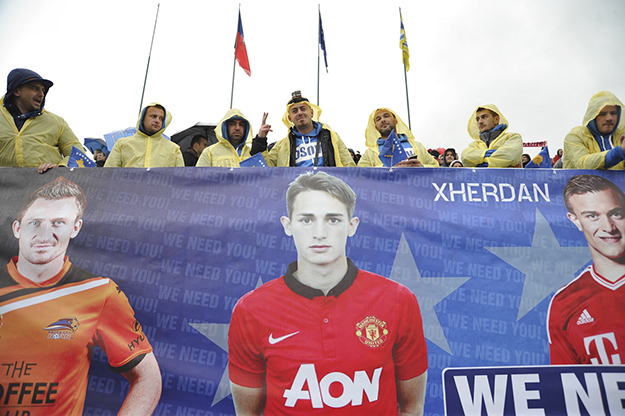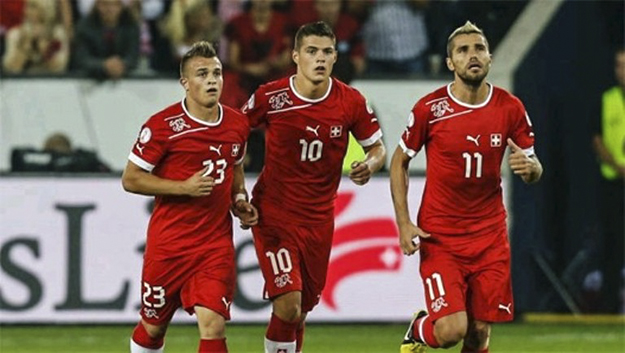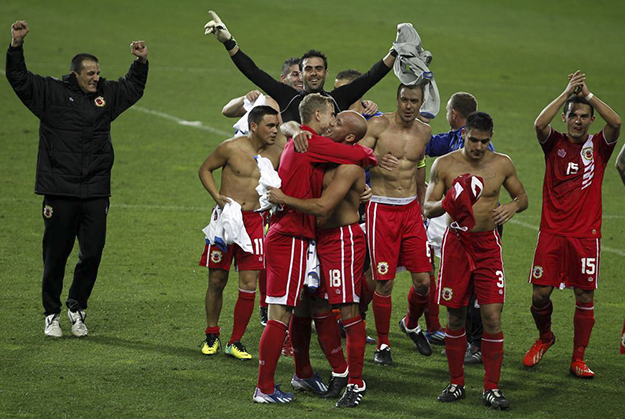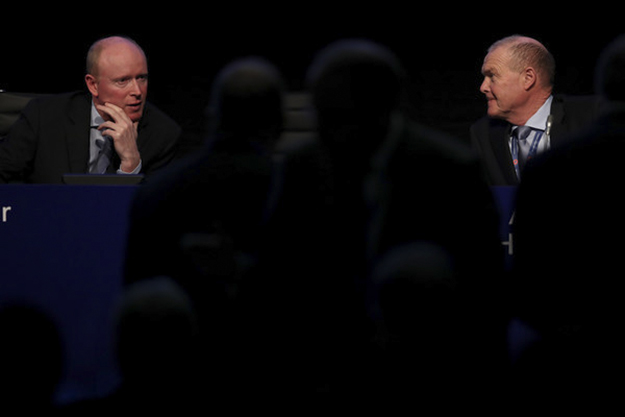“Do we have the right to keep young people from football?” This was the plea made by Fadil Vokrri in front of the 40th UEFA Congress yesterday in Budapest. The head of the Federata e Futbollit e Kosoves (the Football Federation of Kosovo, FFK) was articulating Kosovo’s request for admission into UEFA, his main argument being the sporting isolation faced by Kosovars due to their disputed state. It almost looked like a desperate quest for the man who has spent his last eight years in charge of football in Kosovo.
A former KF Prishtina striker and the only Kosovar ever to play in the Yugoslav national team, Fadil Vokrri is certainly a man for desperate battles. In the first half of the ’80s he earned his team a famous away win against Red Star Belgrade at the Marakana stadium. Since taking the helm of the FFK in 2008, he has campaigned extensively for the admission of Kosovo into FIFA and UEFA and for the end of footballing isolation for his country. In 2014 he managed to obtain FIFA permission for Kosovar clubs and representative teams to play international friendlies against FIFA members; it was a compromise solution that didn’t allow Kosovo to display any national symbol, nor to play its national anthem. The first match under such provisions was an unspectacular goalless draw against Haiti in Mitrovica on March 5, 2014.
Vokrri took the floor just after the UEFA Congress had rejected an amendment to the UEFA Statutes, thereby confirming UN recognition as a requirement for admission. It was bad news for Kosovo, currently recognised by 108 UN members out of 193, and vetoed from becoming a member by Russia. The vote for Kosovo’s admission into UEFA went on nevertheless, a decision to vote via secret ballot being approved with a 45-4 majority. Kosovo’s application was then accepted with 28 of the 54 delegates voting in favor, 24 against and two delegates abstaining. It’s a decision that enables Vokrri to seek Kosovo’s admission into football’s world governing body next week; the FIFA Congress in Mexico City (due to be held on May 13) will be asked to vote on the matter.
Yet key issues remain to be tackled, and the outcome is uncertain, as the admission of Kosovo in UEFA is in many aspects unprecedented in football history.
Who will play for the Kosovo national team?
In the past few years many have dreamt of a Kosovar dream team, as the diaspora has proved a rich talent pool for a number of national teams. In 2014 Belgium secured the services of Manchester United wonderboy Adnan Januzaj. His national team choice had become quite an affair on the eve of the 2014 World Cup: His heritage meant he could play for Turkey, Albania, Serbia and possibly some other former Yugoslav republic (Croatia also tried to lure the player), his birthplace enabled him to play for Belgium and his residence made him an interesting prospect for England. Even Vokrri tried to court the winger for the Kosovo representative team.
Januzaj is by no means a peculiar case, nor is Finnish national Perparim Hetemaj, who was born in Skenderaj and moved to Finland when he was six. On June 11, 2016, as Albania and Switzerland take to the pitch for their Pool A match at Euro 2016 in France, two Kosovar brothers might find themselves lined up one against another. Granit and Taulant Xhaka developed their talent together in Basel, where both were born, and both played for Switzerland at youth level before going separate ways. Granit made his debut for La Nati, the Swiss senior national team, at Wembley and went on to play 40 matches, pocketing a goal at the 2014 World Cup in the progress. Taulant instead chose to take Albanian citizenship and respond to the call up to Gianni De Biasi’s team. He made his debut in September 2014 in a historic away win over Portugal, subsequently becoming a regular for the team who gained qualification to the European Championships for the first time in Albania’s history.
Taulant and Granit Xhaka represent the two main directions that footballer from the Kosovar diaspora have taken. Apart from Taulant Xhaka, the Albanian team boasts a vast contingent of players from Kosovo: from goalkeeper Etrit Berisha to team captain Lorik Cana (both born in Prishtina), to Migjen Basha and Shkelzen Gashi, who were born in Switzerland to Kosovar Albanian parents and decided to represent their roots rather than their birthplace.
Switzerland is the largest recipient of the diaspora of Yugoslav Albanians. The confederation is home to 300-400,000 ethnic Albanians from Kosovo and Macedonia: Albanians represent 5 percent of the ethnic make-up of Switzerland, and four out of five Swiss Albanians hail from Kosovo. A fact well represented by La Nati, which counts on the talents of three Macedonians (Blerim Dzemaili, Pajtim Kasami and Admir Mehmedi) and at least four Kosovars: the aforementioned Granit Xhaka, plus Shani Tarashaj, Valon Behrami and Xherdan Shaqiri.
That’s why some are hoping the admission of Kosovo could enable the team to reunite the scattered talent under one flag. The thought was enough to scare the Swiss delegate at the UEFA Congress, who urged caution in dealing with the issue (while the Albanian delegation admitted the risk of talent draining but nonetheless asked for a green light for Kosovo).
But the Kosovar team of wonders is likely only a matter of fantasy football, as FIFA law doesn’t allow for team switching after having played at least once for the “A” national team. The FIFA Statutes (Article 5, paragraph 2, Section III: Eligibility to play for representative teams) clearly states that “any Player who has already participated in a match (either in full or in part) in an Official Competition of any category or any type of football for one Association may not play an international match for a representative team of another Association.”
Article 8, paragraph 1 allows players to switch nationality only once — provided they haven’t played at “A” international level for their association. This rule allowed Taulant Xhaka to play for Albania after representing Switzerland at youth level, but effectively rules out all chances that Shaqiri, Januzaj and the others might be able to represent Kosovo. The only condition enabling a player to play for another Football Association (FA) would be a case in which he “permanently loses the nationality” of the country he already represented “without his consent or against his will due to a decision by a government authority” (Article 8, paragraph 2).
Apart from in these unusual circumstances, it is unlikely that many top players would actually be willing to switch their jersey to take up a newborn national team anyway; in the past some have been clear in stating that they would not switch allegiances, despite welcoming the admission of Kosovo into meaningful football.
Not only is the dream of a Kosovar wonder team farfetched, but the actual representative team of Kosovo is likely to lose its captain, Latina goalkeeper Samir Ujkani: The player, who also holds Belgian nationality, has in fact already represented Albania at senior level, making his debut against Italy in 2008 after receiving an Albanian passport. While he has been able to play for the Kosovo representative team in friendlies, he will be unable to play for the full national team.
Will Kosovo be able to play in the 2018 World Cup qualifiers?
Next week the FIFA Congress in Mexico City will vote on the admission of both Kosovo and Gibraltar: The two territories might become FIFA members number 210 and 211. While Gibraltar had to appeal to the Court of Arbitration for Sport (CAS) in order to force FIFA to consider its application, Kosovo’s path seems already paved. For this reason, seeing as the UEFA qualifiers for the 2018 World Cup will get underway at the beginning of September, some have speculated that Kosovo might be fast-tracked into the preliminary World Cup competition.
In this case, Kosovo and Gibraltar could be added to groups H and I, which consist of only five teams, one less than all the other groups. And Kosovo might have an added zing in their quest to reach the finals: the host country is the member of the UN Security Council that has been actively countering Kosovo’s recognition, to the extent of vetoing it — Russia.
However there are doubts as to whether the late additions could be possible. Not only is one of the two groups set to be partnered with Russia (thereby enabling the host country — which doesn’t take part in the qualification process — to play friendlies against the team with a “spare” date), but the draw for the UEFA region qualifiers has already been made. Moreover, the European qualifiers are just a part of the whole World Cup preliminary competition, which started way back on March 12, 2015. FIFA was keen to stress how, for the first time, all 209 FIFA members confirmed their participation (although three — Indonesia, Zimbabwe and Kuwait — have been excluded so far) and the regulations for the tournament stipulate that “the associations shall complete and send the official entry form to the FIFA general secretariat in accordance with the deadline stipulated in the relevant FIFA circular” (Article 19).
Although it is not possible to find such a circular on FIFA’s official website, it is highly debatable whether FIFA could fast-track an association into a competition that has already started. Gibraltar may stand a slightly better chance, as they might argue that they were prevented from submitting their entry by — according to the CAS ruling — FIFA unlawfully rejecting their application for FIFA membership back in 2014.
And what about the UEFA Statutes?
One ambiguous aspect of the admission of Kosovo into UEFA was the voting down of the proposed change to the UEFA Statutes. Currently, the Statutes stipulate that “Membership of UEFA is open to national football associations situated in the continent of Europe, based in a country which is recognised by the United Nations as an independent state, and which are responsible for the organisation and implementation of football-related matters in the territory of their country” (Article 5 “Membership”, paragraph 1, Section III. Membership). The proposed statute amendment needed a two thirds majority to pass, a measure that was missed by only two votes; 34 delegates out of 54 favored the change.
The Serbian and Montenegrin delegates, Tomislav Karadzic and former footballing legend Dejan Savicevic, while debating Kosovo’s request of membership, were keen to stress that the admission would have no legal and juridical grounds. The former Red Star Belgrade and AC Milan star asked: “If we accept Kosovo in UEFA, does this mean that the congress is above the Statutes?” The issue was addressed by Alasdair Bell, UEFA Director of Legal Affairs, sparking a debate on the definition of statehood. Bell stated: “The UN doesn’t recognize states, states recognize states,” turning the question into an interpretative issue.
Everything revolves around the ambiguity of the wording: “recognised by the United Nations as an independent state” in Article 5. While Serbia and Montenegro argue that membership to the UN is the prerequisite, the UEFA legal head advocated that the formulation is interpretable and that, as Kosovo is recognized by more than half of the UN members, then it can be considered as recognized by the UN. Serbian sports minister Vanja Udovicic (a former waterpolo national team captain) and the head of the Serbian government office for Kosovo Marko Djuric announced that theSerbian FA will appeal against the admission of Kosovo to the CAS.
The outcome of any such appeal is very difficult to predict, as there are no juridical precedents. The only other non-UN member to be admitted into UEFA since the statutory requisite has been in force was Gibraltar, but this case is quite different. The British “Overseas Territory” had in fact submitted its application before the UN requisite was included in the Statutes, a fact that enabled them to successfully overturn the rejection in front of the CAS. Yesterday the CAS also upheld another appeal by the Gibraltar FA against the decision by FIFA not to submit their membership application to the Congress, thereby earning the right to the vote next week in Mexico City.
It’s not clear what the CAS decision will be. How will it judge on the Statutes’s ambiguity?; Will it ask UEFA to amend its Statutes?; Will it overturn the Congress’s decision on Kosovo or consider it a fait accompli? The outcome might have far-reaching consequences, with UEFA and FIFA wishing to keep in check uncomfortable political situations such as Northern Cyprus and the self-proclaimed republics of the former Soviet Union. Nothing is over until the CAS says it’s over, but — in a week that has also seen significant steps toward the borders of the Schengen visa-free travel regime being removed for the republic — Kosovo felt an exhilarating feeling and will be more determined than ever to punch its way into the football that counts.K






